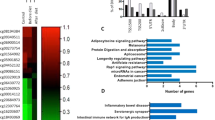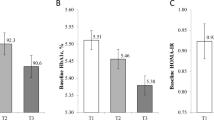Abstract
Background
DNA methylation is an epigenetic mechanism through which environmental factors including nutrition and inflammation influence health. Obesity is a major modifiable risk factor for many common diseases including cardiovascular diseases and cancer. In particular, obesity-induced inflammation resulting from aberrantly-methylated inflammatory genes may drive risk of several non-communicable diseases including colorectal cancer (CRC). This study is the first to investigate the effects of weight loss induced by bariatric surgery (BS) on DNA methylation in the rectum and in cell-free DNA (cfDNA) from blood.
Subjects and methods
DNA methylation was quantified in rectal mucosal biopsies and cfDNA from serum of 28 participants with obesity before and 6 months after BS, as well as in 12 participants without obesity (control group) matched for age and sex from the Biomarkers Of Colorectal cancer After Bariatric Surgery (BOCABS) Study. DNA methylation of LEP, IL6, POMC, LINE1, MAPK7 and COX2 was quantified by pyrosequencing.
Results
BMI decreased significantly from 41.8 kg/m2 pre-surgery to 32.3 kg/m2 at 6 months after BS. Compared with the control group, obesity was associated with lower LEP methylation in both the rectal mucosa and in cfDNA from serum. BS normalised LEP methylation in DNA from the rectal mucosa but not in cfDNA. BS decreased methylation of some CpG sites of LINE1 in the rectal mucosal DNA and in cfDNA to levels comparable with those in participants without obesity. Methylation of POMC in rectal mucosal DNA was normalised at 6 months after BS.
Conclusion
BS reversed LINE1, POMC and LEP methylation in the rectal mucosa of patients with obesity to levels similar to those in individuals without obesity. These findings support current evidence of effects of BS-induced weight loss on reversibility of DNA methylation in other tissues. The DNA methylation changes in the rectal mucosa shows promise as a biomarker for objective assessment of effects of weight loss interventions on risk of cancer and other diseases.
This is a preview of subscription content, access via your institution
Access options
Subscribe to this journal
Receive 12 print issues and online access
$259.00 per year
only $21.58 per issue
Buy this article
- Purchase on Springer Link
- Instant access to full article PDF
Prices may be subject to local taxes which are calculated during checkout


Similar content being viewed by others
Data availability
The datasets generated and analysed during the current study are available from the corresponding author on reasonable request.
References
Ma Y, Yang Y, Wang F, Zhang P, Shi C, Zou Y, et al. Obesity and risk of colorectal cancer: a systematic review of prospective studies. PLoS ONE. 2013;8:e53916.
Ning Y, Wang L, Giovannucci EL. A quantitative analysis of body mass index and colorectal cancer: findings from 56 observational studies. Obes Rev. 2010;11:19–30.
Ben Q, An W, Jiang Y, Zhan X, Du Y, Cai QC, et al. Body mass index increases risk for colorectal adenomas based on meta-analysis. Gastroenterology. 2012;142:762–72.
Li H, Boakye D, Chen X, Hoffmeister M, Brenner H. Association of body mass index with risk of early-onset colorectal cancer: systematic review and meta-analysis. Am J Gastroenterol. 2021;116:2173–83.
Yehuda-Shnaidman E, Schwartz B. Mechanisms linking obesity, inflammation and altered metabolism to colon carcinogenesis. Obes Rev. 2012;13:1083–95.
Hanahan D, Weinberg RA. Hallmarks of cancer: the next generation. Cell. 2011;144:646–74.
Yu J, Zhou X, Li L, Li S, Tan J, Li Y, et al. The long-term effects of bariatric surgery for type 2 diabetes: systematic review and meta-analysis of randomized and non-randomized evidence. Obes Surg. 2015;25:143–58.
Schauer DP, Feigelson HS, Koebnick C, Caan B, Weinmann S, Leonard AC, et al. Bariatric surgery and the risk of cancer in a large multisite cohort. Ann Surg. 2019;269:95–101.
Afshar S, Malcomson F, Kelly SB, Seymour K, Woodcock S, Mathers JC. Biomarkers of colorectal cancer risk decrease 6 months after Roux-en-Y gastric bypass surgery. Obes Surg. 2018;28:945–54.
Sams VG, Blackledge C, Wijayatunga N, Barlow P, Mancini M, Mancini G, et al. Effect of bariatric surgery on systemic and adipose tissue inflammation. Surg Endosc. 2016;30:3499–504.
Crujeiras AB, Morcillo S, Diaz-Lagares A, Sandoval J, Castellano-Castillo D, Torres E, et al. Identification of an episignature of human colorectal cancer associated with obesity by genome-wide DNA methylation analysis. Int J Obes. 2019;43:176–88.
Nicoletti CF, Nonino CB, de Oliveira BAP, Pinhel MAdeS, Mansego ML, Milagro FI, et al. DNA methylation and hydroxymethylation levels in relation to two weight loss strategies: energy-restricted diet or bariatric surgery. Obes Surg. 2016;26:603–11.
Lisanti S, Omar WAW, Tomaszewski B, De Prins S, Jacobs G, Koppen G, et al. Comparison of methods for quantification of global DNA methylation in human cells and tissues. PLoS ONE. 2013;8:e79044.
Boughanem H, Martin-Nuñez GM, Torres E, Arranz-Salas I, Alcaide J, Morcillo S, et al. Impact of tumor line-1 methylation level and neoadjuvant treatment and its association with colorectal cancer survival. J Pers Med. 2020;10:219.
Maugeri A, Barchitta M, Magnano San Lio R, Favara G, La Mastra C, La Rosa MC, et al. The relationship between body mass index, obesity, and LINE-1 methylation: a cross-sectional study on women from Southern Italy. Dis Markers. 2021;2021:2021–7.
Sedaghat F, Cheraghpour M, Hosseini SA, Pourvali K, Teimoori-Toolabi L, Mehrtash A, et al. Hypomethylation of NANOG promoter in colonic mucosal cells of obese patients: a possible role of NF-κB. Br J Nutr. 2019;122:499–508. https://doi.org/10.1017/S000711451800212X.
ElGendy K, Malcomson FC, Bradburn DM, Mathers JC. Effects of bariatric surgery on DNA methylation in adults: a systematic review and meta-analysis. Surg Obes Relat Dis. 2019;16:128–36.
Tóth K, Wasserkort R, Sipos F, Kalmár A, Wichmann B, Leiszter K, et al. Detection of methylated Septin 9 in tissue and plasma of colorectal patients with neoplasia and the relationship to the amount of circulating cell-free DNA. PLoS ONE. 2014;9:e115415.
Kerachian MA, Kerachian M. Long interspersed nucleotide element-1 (LINE-1) methylation in colorectal cancer. Clinica Chimica Acta. 2019;488:209–14.
Barres R, Kirchner H, Rasmussen M, Yan J, Kantor FR, Krook A, et al. Weight loss after gastric bypass surgery in human obesity remodels promoter methylation. Cell Rep. 2013;3:1020–7.
Koda M, Sulkowska M, Kanczuga-Koda L, Surmacz E, Sulkowski S. Overexpression of the obesity hormone leptin in human colorectal cancer. J Clin Pathol. 2007;60:902–6.
Kirchner H, Nylen C, Laber S, Barrès R, Yan J, Krook A, et al. Altered promoter methylation of PDK4, IL1 B, IL6, and TNF after Roux-en y gastric bypass. Surg Obes Relat Dis. 2014;10:671–8.
King WC, Chen JY, Bond DS, Belle SH, Courcoulas AP, Patterson EJ, et al. Objective assessment of changes in physical activity and sedentary behavior: pre- through 3 years post-bariatric surgery. Obesity. 2015;23:1143–50.
Berglind D, Willmer M, Eriksson U, Thorell A, Sundbom M, Uddén J, et al. Longitudinal assessment of physical activity in women undergoing Roux-en-Y gastric bypass. Obes Surg. 2015;25:119–25.
Merck. GenEluteTM Mammalian Genomic DNA Miniprep Kit Protocol [Internet]. 2019. Available from: https://www.sigmaaldrich.com/technical-documents/protocols/biology/genelute-mammalian-genomic-dna-miniprep-kit.html.
Qiagen. DNeasy® Blood & Tissue Handbook [Internet]. 2006. Available from: http://www.bea.ki.se/documents/EN-DNeasyhandbook.pdf.
Zymo research. EZ DNA Methylation-GoldTM kit: INSTRUCTION MANUAL [Internet]. Available from: https://files.zymoresearch.com/protocols/_d5005_d5006_ez_dna_methylation-goldga_o_kit.pdf.
Marques-Rocha JL, Milagro FI, Mansego ML, Mourão DM, Martínez JA, Bressan J. LINE-1 methylation is positively associated with healthier lifestyle but inversely related to body fat mass in healthy young individuals. Epigenetics. 2016;11:49–60.
Duggan C, Xiao L, Terry MB, McTiernan A. No effect of weight loss on LINE-1 methylation levels in peripheral blood leukocytes from postmenopausal overweight women. Obesity. 2014;22:2091–6.
Houde A-A, Légaré C, Biron S, Lescelleur O, L. BB SM, et al. Leptin and adiponectin DNA methylation levels in adipose tissues and blood cells are associated with BMI, waist girth and LDL-cholesterol levels in severely obese men and women. BMC Med Genet. 2015;16:29.
Obermann-Borst SA, Eilers PHC, Tobi EW, De Jong FH, Slagboom PE, Heijmans BT, et al. Duration of breastfeeding and gender are associated with methylation of The LEPTIN gene in very young children. Pediatr Res. 2013;74:344–9.
Eder K, Baffy N, Falus A, Fulop AK. The major inflammatory mediator interleukin-6 and obesity. Inflamm Res. 2009;58:727–36.
Konwar C, Del Gobbo GF, Terry J, Robinson WP. Association of a placental Interleukin-6 genetic variant (rs1800796) with DNA methylation, gene expression and risk of acute chorioamnionitis. BMC Med Genet. 2019;20:36.
Carraro JCC, Mansego ML, Milagro FI, Chaves LO, Vidigal FC, Bressan J, et al. LINE-1 and inflammatory gene methylation levels are early biomarkers of metabolic changes: association with adiposity. Biomarkers. 2016;21:625–32.
Weaver ICG, Cervoni N, Champagne FA, D’Alessio AC, Sharma S, Seckl JR, et al. Epigenetic programming by maternal behavior. Nat Neurosci. 2004;7:847–54.
Kuehnen P, Mischke M, Wiegand S, Sers C, Horsthemke B, Lau S, et al. An alu element-associated hypermethylation variant of the POMC gene is associated with childhood obesity. PLoS Genet. 2012;8:e1002543.
Wu Y, Patchev AV, Daniel G, Almeida OFX, Spengler D. Early-life stress reduces dna methylation of the pomc gene in male mice. Endocrinology. 2014;155:1751–62.
Slattery ML, Wolff RK, Curtin K, Fitzpatrick F, Herrick J, Potter JD, et al. Colon tumor mutations and epigenetic changes associated with genetic polymorphism: insight into disease pathways. Mutat Res Fundam Mol Mech Mutagen. 2009;660:12–21.
Slattery ML, Lundgreen A, Wolff RK. MAP kinase genes and colon and rectal cancer. Carcinogenesis. 2012;33:2398–408.
Tesser-Gamba F, Lopes LJ, da S, Petrilli AS, Toledo SRC. MAPK7 gene controls proliferation, migration and cell invasion in osteosarcoma. Mol Carcinog. 2016;55:1700–13.
Tian XQ, Sun DF, Zhao SL, Xiong H, Fang JY. Screening of potential diagnostic markers and therapeutic targets against colorectal cancer. Onco Targets Ther. 2015;8:1691–9.
Qi Y, Uchida T, Yamamoto M, Yamamoto Y, Kido K, Ito H, et al. Perioperative elevation in cell-free DNA levels in patients undergoing cardiac surgery: possible contribution of neutrophil extracellular traps to perioperative renal dysfunction. Anesthesiol Res Pract. 2016;2016:2794364–11.
Martín-Núñez GM, Cabrera-Mulero A, Alcaide-Torres J, García-Fuentes E, Tinahones FJ, Morcillo S. No effect of different bariatric surgery procedures on LINE-1 DNA methylation in diabetic and nondiabetic morbidly obese patients. Surg Obes Relat Dis. 2017;13:442–50.
Macías-González M, Martín-Núñez GM, Garrido-Sánchez L, García-Fuentes E, Tinahones FJ, Morcillo S. Decreased blood pressure is related to changes in NF-kB promoter methylation levels after bariatric surgery. Surg Obes Relat Dis. 2018;14:1327–34.
Author information
Authors and Affiliations
Contributions
KE is the corresponding author, responsible for writing the manuscript, conducting the laboratory experiments, extracting and analysing data, interpreting results and creating figures and tables. FCM assisted in laboratory experiments, analysing data, laboratory work, analysing data, writing and revising the manuscript. SA designed and conducted the BOCABS study including ethical submission, recruitment and biological specimen collection. MB contributed to feedback and final revisions of the manuscript. JCM supervised the BOCABS study, including patient recruitment and sample collection, supervised laboratory work, provided feedback on the results and data analysis, and contributed to writing and revising the manuscript. All authors read and approved the final version of the manuscript.
Corresponding author
Ethics declarations
Competing interests
The authors declare no competing interests.
Additional information
Publisher’s note Springer Nature remains neutral with regard to jurisdictional claims in published maps and institutional affiliations.
Supplementary information
Rights and permissions
Springer Nature or its licensor (e.g. a society or other partner) holds exclusive rights to this article under a publishing agreement with the author(s) or other rightsholder(s); author self-archiving of the accepted manuscript version of this article is solely governed by the terms of such publishing agreement and applicable law.
About this article
Cite this article
ElGendy, K., Malcomson, F.C., Afshar, S. et al. Effects of obesity, and of weight loss following bariatric surgery, on methylation of DNA from the rectal mucosa and in cell-free DNA from blood. Int J Obes 47, 1278–1285 (2023). https://doi.org/10.1038/s41366-023-01384-4
Received:
Revised:
Accepted:
Published:
Issue Date:
DOI: https://doi.org/10.1038/s41366-023-01384-4



